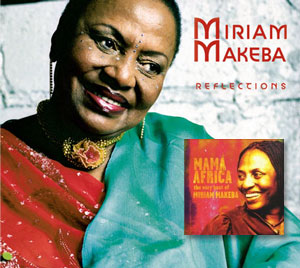The Legacy of Miriam Makeba
By Brian E. Muhammad | Last updated: Nov 28, 2008 - 11:41:00 AMWhat's your opinion on this article?

|
(FinalCall.com) - Not since the transition of Nina Simone, the “high priestess” of soul, did we lose both an artist and spirit of the struggle for liberation, freedom, justice, and equality.
The world lost another spirit of the struggle with the death of South African singer Miriam Makeba.
The 76-year-old artist and Good Will Ambassador affectionately called “Mama Africa” died after collapsing in Italy after a performance.
Miriam Zenzi Makeba was born in Johannesburg, March 4, 1932, the daughter of a Xhosa father and Swazi mother.
Ms. Makeba began singing as a child, winning a talent contest at a missionary school at 13-years-old. She began her professional career with the South African group “The Manhattan Brothers” and then “Miriam Makeba and The Skylarks.”
Her talent opened the door to Europe where she met activist, entertainer Harry Belafonte who was instrumental in her coming to the United States.
In 1959, Ms. Makeba was the first South African to win a Grammy Award for the album “A Night With Harry Belafonte and Miriam Makeba.”
Her versatility as an artist was expressed with her popular “Pata Pata” and the Xhosa language song “Qongqothwane,” more famously known as “The Click Song.”
While abroad, the singer was exiled from her home country for acting in the anti-apartheid play, “Come Back Africa.” She also spoke against the racist apartheid regime after the Sharpeville massacre on March 21, 1960, when police fired on protesters, killing 69 and injuring 300 people.
The incident was a watershed moment prompting armed resistance by the Blacks of the country.
Though barred from South Africa, Ms. Makeba lived and worked in various countries such as the United States, France, Belgium, and Guinea where she fought for the cause of her people.
She was once married to South African trumpeter Hugh Masekela and, from 1967 to 1973, was the wife of activist Kwame Ture (Stokely Carmichael).
It was her marriage to Kwame Ture that caused her problems with the U.S. government and the entertainment industry. In 1968 the couple relocated to Guinea, West Africa under the political protection of President Ahmed Sekou Toure.
During the exile years, Ms. Makeba spared no opportunity to highlight the plight of her suffering people, speaking before the UN Special Committee on Apartheid in 1963 and later as a special delegate for Guinea.
Ms. Makeba also collaborated with other artists for the cause such as Hugh Masekela, Nina Simone, and Paul Simon in 1987.
With the fall of the apartheid regime, Nelson Mandela invited her to return home in 1990, ending 30 years of exile.
Ms. Makeba never described herself as a performer for politics, though her music and involvement in various causes was defined by her identity and struggle of her people.
A true believer in being African, she was quoted saying, “I’m an African child and I believe all Africa belongs to me; that is what I believe,” and that is what the young people “should be fighting for.”
Miriam Makeba was an artist who cared not about popularity; her legacy is written in the pages of history, integrity, and Pan-Africanism. Mr. Mandela said, “She was South Africa’s first lady of song and so richly deserved the title of ‘Mama Africa.’ She was a mother to our struggle and to the young nation of ours.”
Related link:
FAO Web Video: Tribute to Miriam Makeba
INSIDE STORIES AND REVIEWS
-
-
About Harriett ... and the Negro Hollywood Road Show
By Rabiah Muhammad, Guest Columnist » Full Story -
Skepticism greets Jay-Z, NFL talk of inspiring change
By Bryan 18X Crawford and Richard B. Muhammad The Final Call Newspaper @TheFinalCall » Full Story -
The painful problem of Black girls and suicide
By Charlene Muhammad -National Correspondent- » Full Story -
Exploitation of Innocence - Report: Perceptions, policies hurting Black girls
By Charlene Muhammad -National Correspondent- » Full Story -
Big Ballin: Big ideas fuel a father’s Big Baller Brand and brash business sense
By Bryan Crawford -Contributing Writer- » Full Story






 Click Here Stay Connected!
Click Here Stay Connected!








